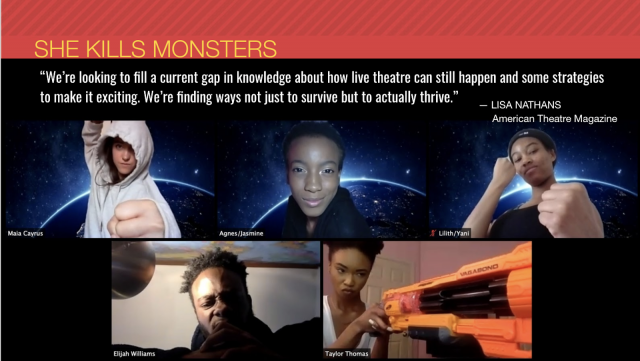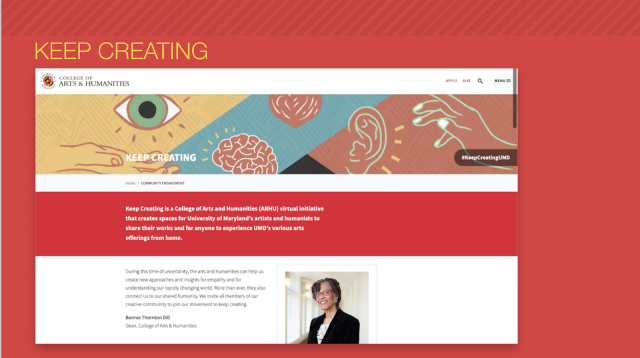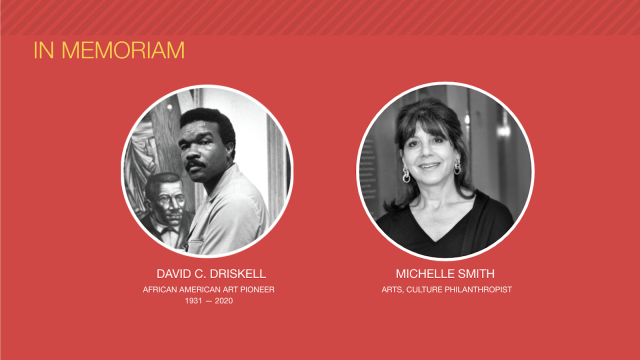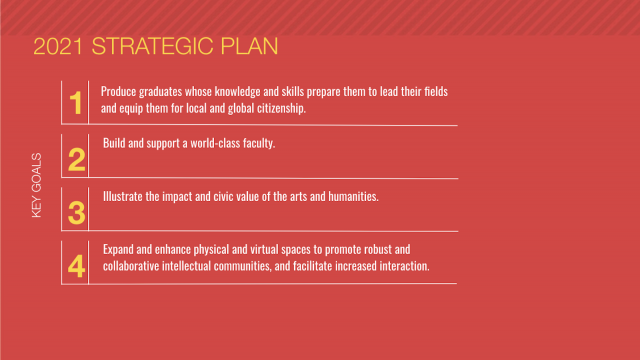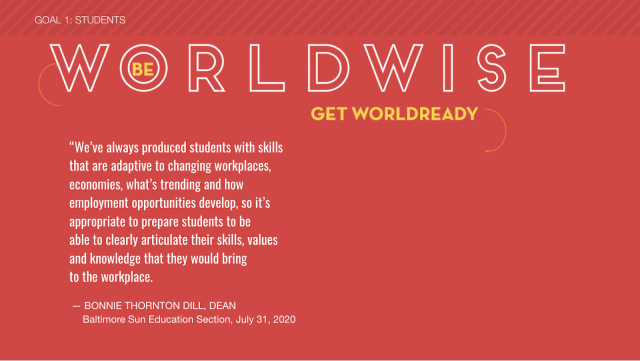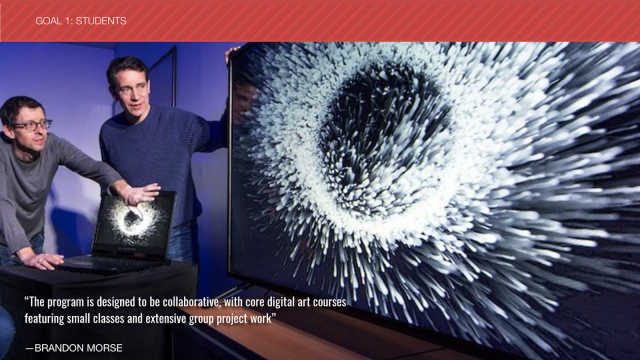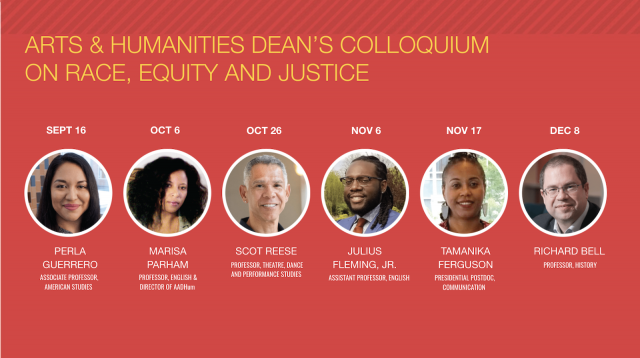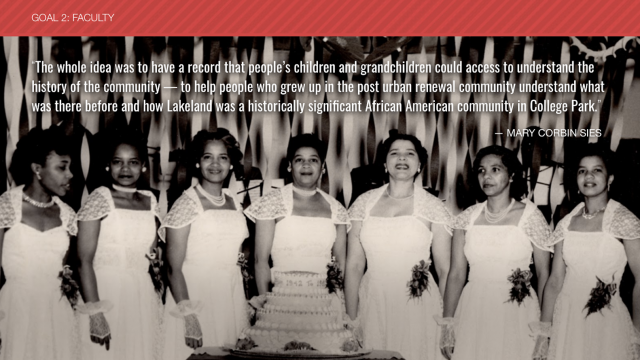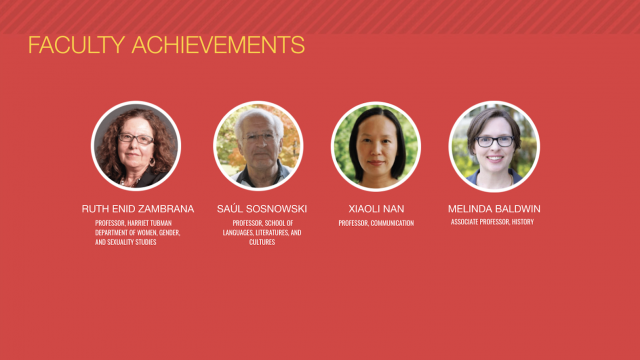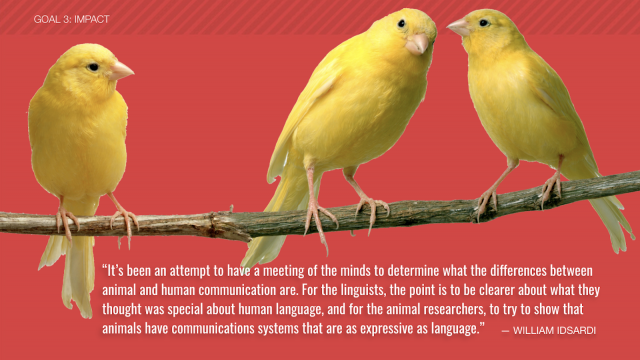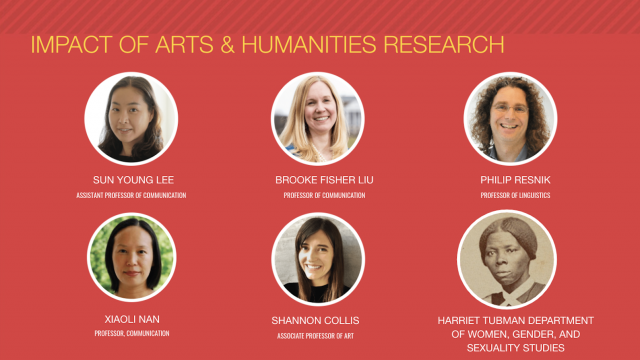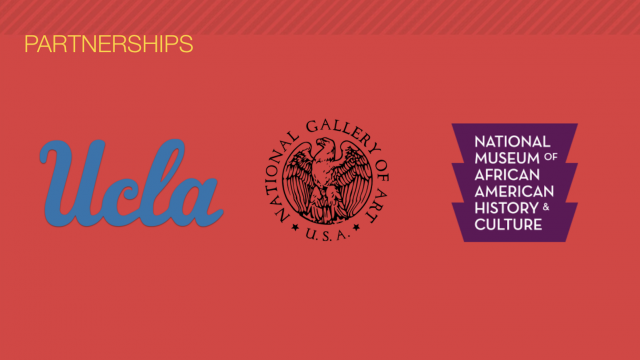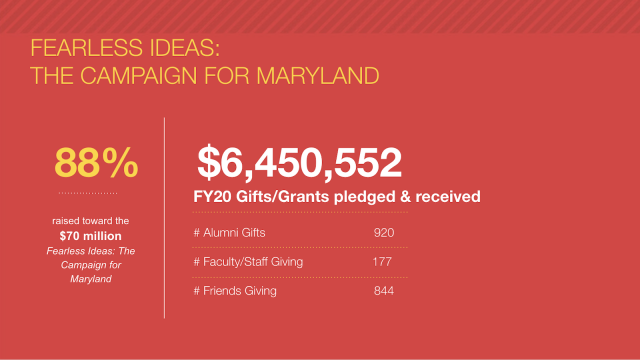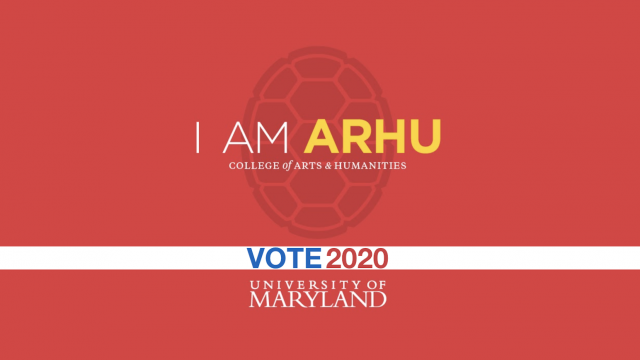2020 State of the College Address
October 20, 2020
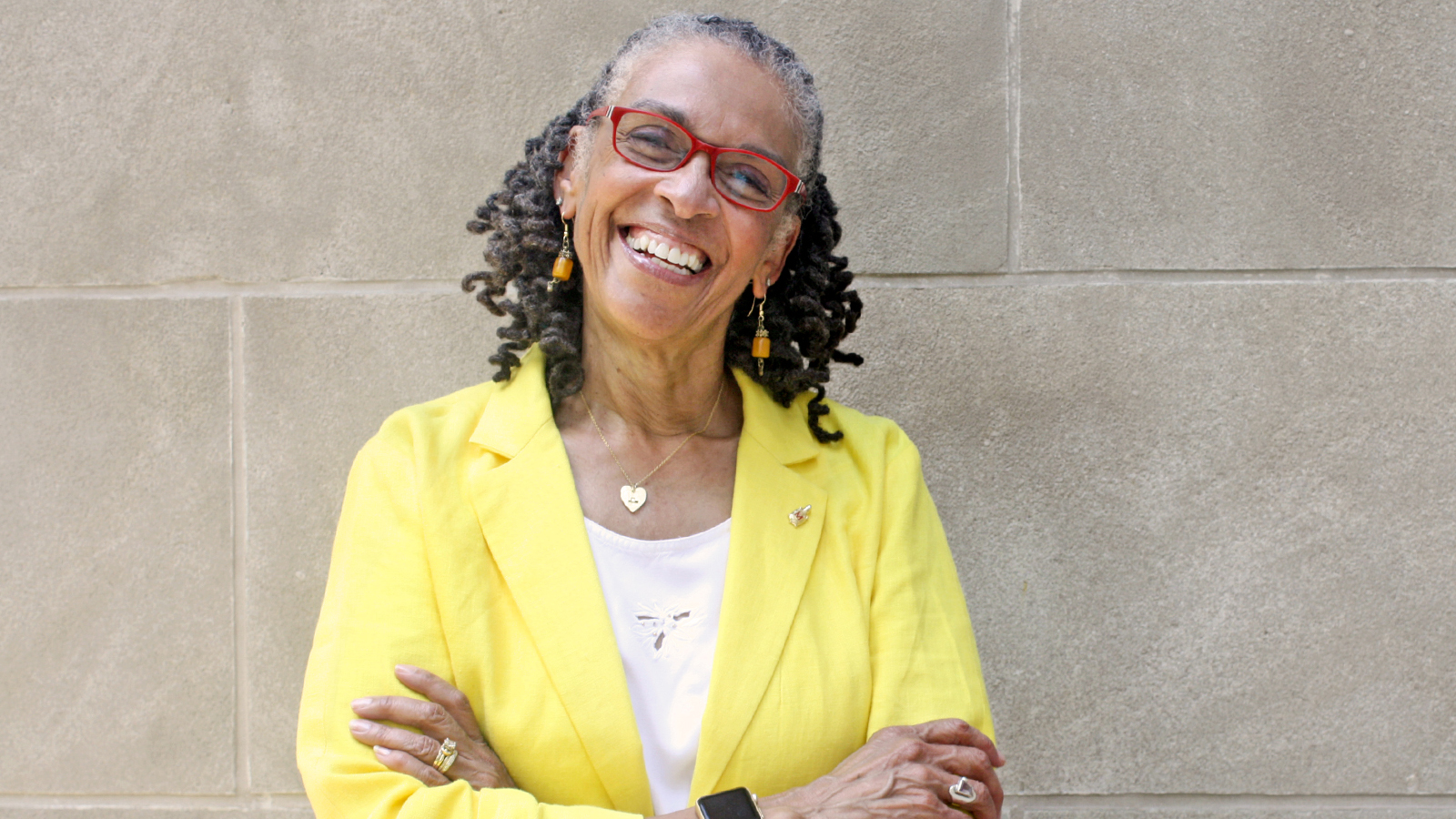
Watch the video of Virtual Convocation and read remarks by Dean Bonnie Thornton Dill.
October 20, 2020, 3 p.m.
Virtual Convocation
Watch here.
Remarks by Dean Bonnie Thornton Dill to students, faculty and staff at the college’s annual convocation.
Acknowledgements | Introduction | Goal 1: Students | Goal 2: Faculty | Goal 3: Impact | Budget and Finance | Conclusion
The Dean: Good Afternoon, and thank you for joining the 20-21 ARHU Convocation. I’m pleased to have this opportunity to celebrate the start of the new year with you. As I begin, I want to thank all of the people who’ve made today’s program possible: staff of The Clarice; the School of Music and the amazing Convocation team in my office —especially my assistant Chant’e Ingram, and assistant dean Nicky Everette and her staff.
Today, I’m in the Gildenhorn Recital Hall in The Clarice Smith Performing Arts Center. In this unsettling year, I wanted to come here, as I typically do for convocation—even to an empty room—to convey the continuities, disruptions and adaptations we are all living.
The purpose of this event, in part, is to reaffirm and renew our community and our shared commitment to teaching, research and service through the arts and humanities at Maryland.
This year, it is more important than ever to acknowledge and highlight the value of our collective enterprise and to recognize the extraordinary commitment and persistence of the members of our community.
2019-20 wasn’t the year that any of us anticipated.
Meeting this moment—building on our mission of excellence and inclusiveness in an unprecedented time of upheaval has challenged us in ways we could not have imagined.
In the fall of 2019, no one could have predicted we’d hold the university’s first-ever virtual commencement, sending the Class of 2020 out into a virtual and uncertain working world.
No one could have predicted that an innovative Zoom theatre performance—which hadn’t even been conceived when the academic year began—would receive positive press in the New York Times.
Or that in only three months—between March and May—the percentage of campus faculty who had taught online would increase from 22 to over 90 percent; a transformative change.
ARHU faculty couldn’t say enough good things about the dedication and patience of the Academic Computing Services (ACS) staff in the Dean’s office who worked tirelessly to help them make this difficult transition. This is a shout out of deep appreciation for ACS.
And, we could not have predicted that while the world was in quarantine, we would watch in horror the high-profile killings of George Floyd and Breonna Taylor and be swept up in a national reckoning on systemic racism, leading the ollege to redouble our work on race, equity and justice.
Through it all, we’ve seen that the need to express and understand human emotions in a time of crises has heightened the importance of the approaches of the arts and humanities. While the university was focused on keepteaching, keeplearning and keepworking, Megan Pagado Wells in The Clarice came up with the idea of keepcreating and our marketing and communications team developed that idea into a web presence and an identity that affirms and promotes ARHU.
This kind of ingenuity and resolve is built upon the leadership and generosity of those who came before us. In the past seven months we lost two members of the UMD/ARHU family whose contributions are unparalleled.
Legendary artist and Distinguished University Professor David. C Driskell, recognized worldwide for his scholarship and expertise in African American art, passed away at the age of 88 from complications of COVID-19. A giant in the art world, Driskell transformed the field of African American art through his scholarship, artistic innovation and through the teaching and mentoring of countless students. As Chair of the Department of Art and Art History, he played an influential role in the hiring of African American art professors. The David C. Driskell Center was established on campus to honor and continue his legacy, and is currently presenting a virtual exhibit of Dr. Driskell’s papers from the collection’s 50,000-plus documents dating back to the 1950s.
Michelle Smith, one of the Washington area’s leading philanthropists and the person for whom the Performing Arts Library and the Collaboratory are named, passed on September 23. The University as a whole and particularly the College of Arts and Humanities benefitted from her vision, commitment and overall joie de vivre. In an email to friends and colleagues, her son wrote: “In every way, my mother sought to live a meaningful and impactful life. She loved ideas and people, and always sought to support both with her time, resources, and encouragement… Her commitment to making the most of every day and every situation are things that will continue to inspire and motivate all who knew and loved her.”
This has been a season of loss for all of us and I want to acknowledge the passing of our family and friends, the empty places in our hearts and extend heartfelt condolences to everyone.
Now I shift to some of the many accomplishments of faculty, staff and students in the college in light of the goals outlined in our 2021 strategic plan. You will find additional highlights in the 2019-20 Year in Review and on the college website.
Students are our first priority, and this year we welcomed over 350 talented and diverse first year and new transfer students into the college. Our retention and graduation rates remain strong and ARHU graduates continue to have a 97% placement rate.
In addition, over 150 doctoral and masters students enrolled in ARHU, reflecting an 8% increase in international students and a 4% increase in underrepresented minority students.
Integrated Career Initiative
An article in the Baltimore Sun at the end of July featured the launch of our curriculum-career integration initiative, “Be Worldwise. Get Worldready.” and fretted a bit about the timing of this initiative in the midst of a global pandemic. We countered that this is the perfect time for such an initiative. Our students’ learning is adaptive to change, and we are preparing them to clearly articulate the skills, values and knowledge that they bring to the workplace at a time when that ability will be most needed.
An example is the new undergraduate major in Immersive Media Design that combines the expertise of faculty in studio art, like Brandon Morse, with that of faculty in computer science. Working together, they provide an interdisciplinary curriculum that will prepare UMD students to collaborate effectively and become leaders in the design, production and technical advancement of augmented and virtual reality, as well as related emerging immersive media and design disciplines and technologies.
Diversity
Deepening the college’s established commitment to teaching and scholarship on inequality and inclusion, we have launched a college-wide Campaign on Race, Equity and Justice, and appointed a standing committee of the same name. The committee is promoting anti-racist practices in the college’s curriculum, scholarship and community engagement activities through the yearlong colloquium series that is acquainting audiences with faculty research and teaching expertise; small grants to support faculty research addressing anti-racism; teaching support teams that will offer services to help reduce implicit bias and unacknowledged forms of racism in the classroom and listings of pertinent courses and resources for equitable and inclusive research.
Our second strategic goal of supporting a world-class faculty faced unprecedented obstacles with the closing of many research and performance spaces. Yet, in the face of these and other barriers, ARHU faculty have continued to produce outstanding scholarship, achieve important recognitions and apply their talents and abilities to address a range of questions, including those related to issues of race, equity and social justice.
Diverse and Inclusive Research Portfolio
For example, American Studies professor Mary Corbin Sies, who won a prize for her co-edited collection on planned communities, has extended that knowledge and insight into a unique university-community partnership with the Lakeland Community Heritage Project (LCHP) built around the cultural history and artifacts of the historically African American community located in College Park. This equitable partnership between LCHP, the Maryland Institute for Technology in the Humanities (MITH) and the Department of American Studies won a $100,000 National Endowment for the Humanities grant to help Lakeland better document, preserve and share its cultural heritage. The project aims to be a model for other small community-led cultural heritage groups and for universities seeking to develop meaningful and impactful engagement with local communities.
Among other noteworthy faculty awards and accomplishments this year, Ruth Enid Zambrana, interim chair of the Harriet Tubman Department of Women, Gender, and Sexuality Studies was named a Distinguished University Professor, the highest academic honor bestowed on tenured faculty by the university. Professor of Communication Xiaoli Nan and Professor of Latin American Literature and Culture Saúl Sosnowski have been named Distinguished Scholar-Teachers, a program that honors a small number of faculty members each year who have demonstrated notable success in both scholarship and teaching.
Finally, history of science author and editor Melinda Baldwin was named the inaugural American Institute of Physics (AIP) Endowed Professor in the History of Natural Sciences.
Enhance Communications Strategies
Telling our stories, making our accomplishments and their impact visible is our third strategic goal and part of our approach has been a college-wide web transformation project. After launching the college site 2 years ago, we have now extended the technology and storytelling capacity to 6 unit sites with 5 additional sites currently underway. You will also see ARHU stories regularly featured in Maryland Today, on the campus website and in other external media.
On their new website, the Department of Linguistics describes a special edition of the British journal Transactions of the Royal Society B to which Bill Idsardi, professor and chair contributed an article about the relationship between animal communication and human language. Along with UMD biologists, psychologists, neuroscientists and linguists, the special edition spotlights how understanding communication systems among animals, such as birds, illuminates what is special about human language.
Demonstrate the Value and Impact of Arts and Humanities Research
ARHU faculty research is also having a direct impact on the current crises. With Coronavirus Research Seed Fund Awards from the Division of Research, communication assistant professor Sun Lee is investigating company responses to the pandemic as part of their corporate social responsibility activities, while communication professor Brooke Fisher Liu is examining how U.S. higher education planned for and responded to the pandemic. Phil Resnik, professor of linguistics won a National Science Foundation grant to develop new computational methods to analyze and classify responses to survey questions about the COVID-19 crisis. A third communication professor, Xiaoli Nan is part of an MPower funded project conducting research on why African Americans, who suffer disproportionately from the adverse health and economic impacts of the pandemic, might accept or reject the anticipated COVID-19 vaccine.
On the subject of climate, Associate Professor of Art, Shannon Collis won a grant to create an immersive audiovisual installation that allows people to experience the environmental effects of oil dredging in Canada’s Athabasca Oil Sands.
And notably this fall, in the culmination of several years of faculty work including gaining the support of family, the Department of Women’s Studies was renamed the Harriet Tubman Department of Women, Gender, and Sexuality Studies. In a year commemorating the passage of the 19th amendment amid rising concern for voter disenfranchisement, the department will honor Tubman’s commitment to suffrage.
Grow Partnerships Regionally, Nationally and Globally
Partnerships and collaborations expand faculty scholarship and innovation and amplify the impact of our work.
- American Studies Professor Janelle Wong is among the co-principal investigators of the 2020 Collaborative Multiracial Post-election Survey, which will measure views on race, immigration and politics in the context of the upcoming presidential election. The project, hosted at UCLA is supported by a $1 million grant from the National Science Foundation.
- The Department of Art History and Archaeology celebrated a 50 year collaboration with the National Gallery of Art through their co-sponsorship of the Middle Atlantic Symposium in the History of Art.
- Julie Greene, professor of history is working with the Smithsonian’s National Museum of African American History and Culture on a project to examine the largely untold history of the influence of immigrants from Africa, the Caribbean and Latin America on African American culture and society. The National Endowment for the Humanities has funded this project.
The COVID-19 pandemic has had a profound impact on the campus and the college budgets.
We have already sustained a 5% cut to our permanent (base) budget and an almost 22% cut to our surplus (fund balance). Together these represent deeper cuts than the college has experienced and, when combined with the campus wide hiring freeze, they produce serious constraints. Nevertheless, I am pleased to say that we managed these cuts, though painful, in a collaborative and transparent manner consistent with values that were discussed and agreed upon across the college. Today, I would describe the college budget as stable. Like everything about this pandemic, we don’t know what the year ahead will bring but so far, so good.
The good financial news is that the college continues to attain support from philanthropic gifts and grants. Following robust activity last year, we have now raised 88% of our $70M goal for the Fearless Ideas Campaign for Maryland.
In conclusion, those of you on the recent ARHU town hall with President Pines may remember his reading from an essay by the writer Arundhati Roy in which she says: the pandemic is a portal. Her point is that this moment has laid bare the inequalities of our society at the same time that it presents the opportunity to imagine and begin to devise a new future. She challenges us to go through this portal leaving the ugliness of the past behind and carrying forward a readiness to imagine a new and better world. If we, artists and humanists, enter this portal with nothing but our knowledge, habits of mind and understanding of human expression, we will be essential creators of a meaningful and life-affirming future.
At this time, in this country, one of the ways we create the future is to VOTE. Voting is one step toward designing the world we want to live in; please take that step.
Again, thank you for joining me today. THE END


